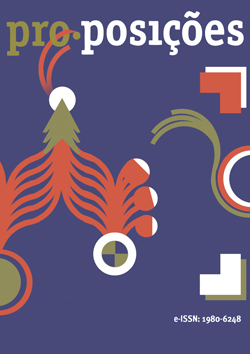Abstract
The essay seeks to address the problem of the social formation of the self. Divided in four parts, in the first one, it reconstructs aspects of Mead’s interactionist theory of education, emphasizing its social, intersubjective dimension. In the second part, it recounts the short story “Negrinha”, by Monteiro Lobato, to show, against the grain, how human action can easily fall into unrestricted obedience and how it destructively marks the ways of life. In the thirdpart, the essay confronts Monteiro Lobato’s short story with aspects of Mead’s theory of action, evidencing the constitutive tension of human formation as self-formation. Finally, it reconstructs a trait of formation as self-formation, inherited from Modernity by Mead, helping it place cooperative sympathy as the ethical core of self-formation. The essay concludes that intersubjective perspectives are more appropriate, in plural social contexts, to rid humans of different forms of servitude.
References
Dalbosco, C. A. (2010). Pragmatismo, teoria crítica e educação. Campinas: Autores Associados.
Dalbosco, C. A. (2011). Kant & a educação. Belo Horizonte: Autêntica.
Dalbosco, C. A. (2014). Die sprachliche Konstitution des Selbst (Self) und die pädagogische Handlung. Pädagogische Rundschau, 68,251-262.
Dalbosco, C. A. (2016). Condição humana e educação do amor-próprio em Jean-Jacques Rousseau.São Paulo: Loyola.
Dalbosco, C. A. (2019). Metamorfoses do conceito de formação: da teleologia fixa ao campo de força. In C. A. Dalbosco, E. H. Mühl, & H.-G. Flickinger (Eds.),Formação humana (Bildung): despedida ou renascimento?(pp.35-64). São Paulo: Cortez Editora.
Freire, P. (2009). Pedagogia da autonomia: saberes necessários à prática educativa. São Paulo: Paz e Terra.
Hegel, G. W. F. (1988). Phänomenologie des Geistes. Hamburg: Meiner.Habermas, J. (1992). Nachmetaphysisches Denken:Philosophische Aufsätze. Frankfurt am Main: Suhrkamp.
Honneth, A. (1994). Kampf um Anerkennung:Zur moralischen Grammatik sozialer Konflikte. Frankfurt am Main: Suhrkamp.
Joas, H. (2000). Praktische Intersubjektivität:die Entwicklung des Werkes von G. H. Mead. Frankfurt am Main: Suhrkamp.
Kant, I. (1998). Beantwortung der Frage: was ist Aufklärung? InWerke in sechs Bänden(Herausgegeben von Wilhelm Weischedel, Vol. 4, pp.53-61). Darmstadt: Wissenschaftliche Buchgesellschaft.
Liessmann, P. K.(2012). Theorie der Unbildung. InH.Hastedt(Ed.),Was ist Bildung?:Eine Textanthologie(pp. 212-222). Stuttgart: Reclam.
Lobato, M. (2001). Negrinha. InIMoriconi(Ed.),Os cem melhores contos brasileiros do século(pp. 78-84). Rio de Janeiro: Objetiva.
Mead, G. H. (1992). Mind, self and society: from the standpoint of a social behaviorist. Chicago: University of Chicago Press.
Mead, G. H. (2010). Espíritu, persona y sociedad: desde el punto de vista del conductismo social. Madrid, Paidós.
Rousseau, J.-J. (1999). Emile (Oeuvres complètes, Vol. 4). Paris: Gallimard.
Teixeira, A. (2000). Pequena introdução à filosofia da educação:a escola progressiva ou a transformação da escola. Rio de Janeiro: DP&A.
Tugendhat, E. (1997). Selbstbewusstsein und Selbstbestimmung:Sprachanalytische Interpretationen. Frankfurt am Main: Suhrkamp.

This work is licensed under a Creative Commons Attribution 4.0 International License.
Copyright (c) 2020 Pró-Posições


